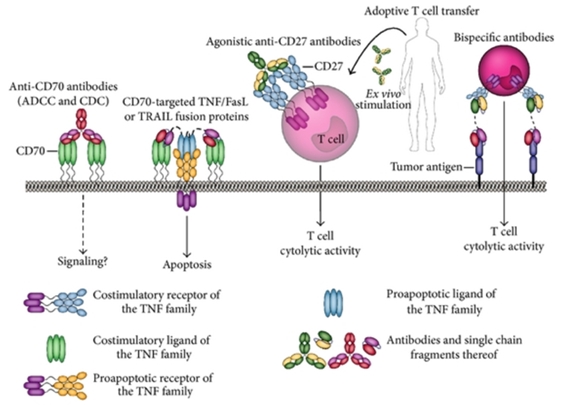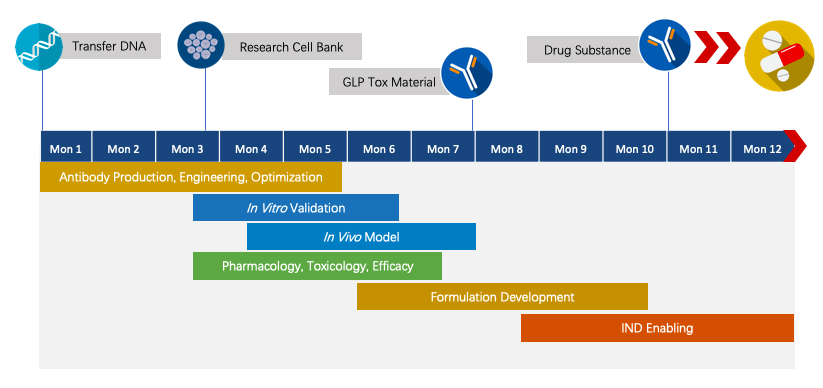About This Program
This program aims to develop anti-CD70 therapeutic Therapeutic Monoclonal antibody for immuno-oncology.
Highly expressed on tumor cells but not healthy tissues, CD70 is an attractive target for antibody-based therapy. Targeting CD70-positive malignancies with CD70-specific monoclonal antibodies have shown promise in preclinical animal models. Therefore, the anti-CD70 antibody has great potentials to be widely applied in the treatment of various diseases with high efficacy.
CD70
CD70 is the membrane-bound ligand of the CD27 receptor, which belongs to the tumor necrosis factor receptor superfamily. CD70 is transiently expressed on activated B and T cells, and mature dendritic cells. It interacts with its receptor CD27 that is more widely expressed on various subsets of B and T cells, and on a subset of natural killer (NK) cells. CD70-mediated effects are generally based on activation of CD27-associated signaling pathways. Here, we show the MOA of CD70/CD27-based agonists for cancer therapy. (see fig1).
-
CD70 is highly expressed on malignant cells and thus a bona-fide target for CD70 antibody-based therapy.
-
CD70 scFv-targeted TRAIL/FasL-based fusion proteins could be used to selectively deliver and locally activate proapoptotic signaling.
-
Utilizing anti-CD27 scFv as a bispecific antibody to bind a tumor-specific targeting antibody fragment may ensure selective modulation and/or inhibition of CD27 signaling in the tumor micro-environment.
 Fig.1 CD70/CD27-based agonists for cancer therapy.1
Fig.1 CD70/CD27-based agonists for cancer therapy.1
Anti-CD70 Antibody in Cancer Studies
Here are some published data about CD70 work as a potential target for cancer immunotherapy.
-
The effect of CD70 antibody (c1F6) on Burkitt's lymphoma (cell line RAJI) and Lymphoblastoid (cell line IM-9).
-
The effect of a CD70 antibody (41D12) on lymphoma.
Indication
The expression of CD70 has been confirmed on many hematological malignancies and carcinomas. Our program primarily focuses on the development of therapeutic antibodies against the high-risk NHL.
Clinical Trials under Progress
-
Currently, only one anti-CD70 therapeutic monoclonal antibody, ARGX-110 (cusatuzumab), advanced to clinical testing on patients with hematological malignancies. Recently, cusatuzumab has been granted orphan drug for the treatment of AML by FDA. (Reported in January 2019)
-
In this case, CD70 is a compelling target for cancer immunotherapy. In an effort to optimally leverage CD70-mediated immune response, the next generation of CD70 targeting treatment attempts to explore combination therapy trials with other immunomodulatory agents.
Program Plan
We have extensive knowledge of end-to-end program development. For each program, we are committed to delivering the final complete program to our clients within 1.5 years prior to entering the IND stage.
 Fig.2 The timeline of Next-IOᵀᴹ programs.
Fig.2 The timeline of Next-IOᵀᴹ programs.
Cooperation
Creative Biolabs is looking for potential partners (include but not limit to major pharma or biotech firms) to develop anti-CD70 therapeutic monoclonal antibody program together. Our scientists are dedicated to bringing together years of valuable experience to our partner and achieve a meaningful partnership. By doing so, we wish to help both parties to proceed with IND and many stages of clinical trials beyond.
If you are interested, please feel free to contact us so that we can discuss the program and other possible opportunities for cooperation. Look forward to working with you in the near future.


 Fig.1 CD70/CD27-based agonists for cancer therapy.1
Fig.1 CD70/CD27-based agonists for cancer therapy.1
 Fig.2 The timeline of Next-IOᵀᴹ programs.
Fig.2 The timeline of Next-IOᵀᴹ programs.
 Download our brochure
Download our brochure